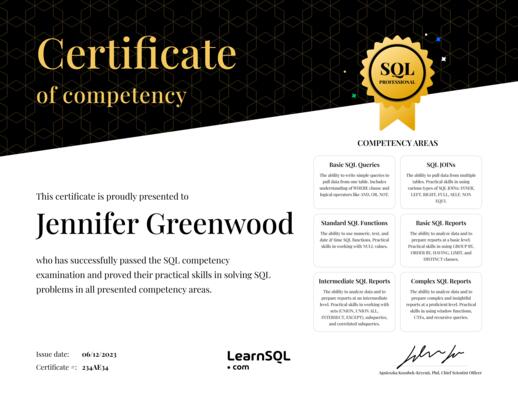Basic Course
SQL Practice Set in PostgreSQL
This online practice set consists of 88 interactive exercises. You will practice using simple statements and clauses, like SELECT or JOIN, as well as more advanced concepts, such as subqueries.
4.73
31,879 learners enrolled
Free trial Yes
Certificate of completion Yes
Time to complete 10 h
Coding challenges 88
Skills you will gain
- Use SELECT and WHERE to filter data.
- Aggregate and group data using clauses.
- Join multiple tables.
- Work with complicated subqueries.
- Use PostgreSQL functions in practice.
Last reviews

Table of contents
Course progress 0%
Exercises completed 0/88
-
Warm up: Selecting from one table
0/9Review the fundamentals of SQL. Practice using SELECT and WHERE to filter data.
-
Aggregation and grouping
0/11Test your knowledge of GROUP BY and ORDER BY clauses.
-
JOINs
0/32Practice using JOIN, LEFT JOIN, and non-equi JOIN. Check your skills of working with multiple tables.
-
Subqueries
0/15Verify your knowledge of subqueries. Practice simple and correlated subqueries.
-
SQL Challenge
0/21Practice your SQL skills. Write SQL queries which combine SELECT, WHERE, JOIN, GROUP BY, HAVING, ORDER BY and subqueries.

Get the Certificate of Competency in SQL
This certificate will confirm your practical SQL problem-solving skills

Description
This exercise set is designed for users who already know how to write basic PostgreSQL queries. It will also be of interest to anyone who wants some online practice to polish or refresh their knowledge of writing queries in PostgreSQL. Keep reading for more details!
What does it take to master a skill? There are several different requirements, but one aspect they have in common is that they require practice. It's no different from writing code. The theory is one thing, but the real fun starts when you work with it for online practice or apply it in a real-world scenario.
So, whether you're a beginner taking your first steps towards writing SQL queries in PostgreSQL or a specialist who wants to refresh your SQL skills through practice, this exercise set will check your knowledge level and show you what you still need to catch up on.

There is always room for development, and today is your chance to complete an exercise or two and ultimately polish your SQL toolkit!
This Exercise Set Includes:
- simple SELECT queries,
- aggregate functions (COUNT, SUM, AVG),
- grouping and ordering results,
- JOINs (querying from multiple tables, self joins, LEFT JOINs, RIGHT JOINs, and NON-EQUI JOINs), and
- subqueries (simple subqueries, subqueries with multiple results, correlated subqueries, and subqueries in the FROM and SELECT clauses).
What's in it for Me?
- 88 interactive exercises. Learn at your own pace, from any location and at any time. Work through hands-on exercises to help you retain what you have learned so far.
- Lifetime access to the course. When you purchase the online course, you'll get instant personal access to all of its content forever.
- Online certificate. After you successfully finish all of the exercises in the online course, you'll receive a downloadable PDF certificate to showcase your accomplishment.
- 30-day money-back guarantee. If you're not satisfied with the quality of the online course, you can get a refund within 30 days of your purchase.
- Exercise hints. You can take advantage of ready-made hints for every exercise, or ask questions and share insights with other members of our community through the Discuss tab.
What Are the Requirements?
- A web browser
- Internet connection
- Understanding of basic SQL concepts presented in our SQL Basics in PostgreSQL course
Learn How to:
- Use SELECT and WHERE to filter data.
- Aggregate and group data using clauses.
- Join multiple tables.
- Work with complicated subqueries.
- Use PostgreSQL functions in practice.
Who Should Take This Course?
- Analysts who use relational databases
- Students taking courses involving relational databases
- Beginning programmers interested in PostgreSQL
- Business database users who want to improve their querying skills
- Anyone who has finished the SQL Basics in PostgreSQL course or has equivalent knowledge
- Anyone who wants some online practice for writing PostgreSQL queries